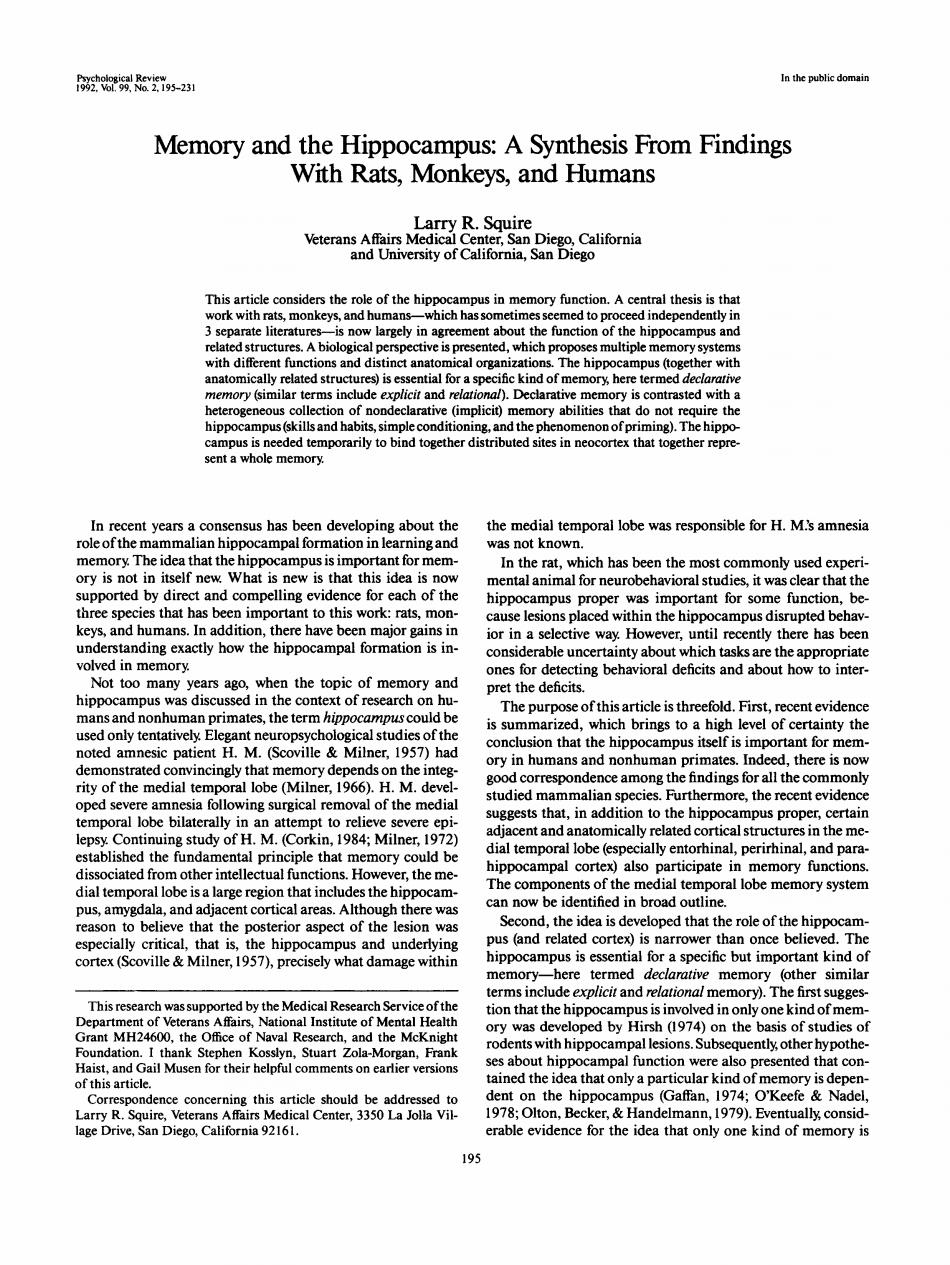正在加载图片...

62is-23 Memory and the Hippocampus:A Synthesis From Findings With Rats,Monkeys,and Humans Larry R.Squire This article c na h largely in a ampus and th dif t fu s The hipp us (t r with plicit and trasteditha hipp ampus6ilsasndhabt,inptcoodno sent a whole memory In recent years a co sus has been developing about the the medial temporal lobe was responsible for H.M.'s amnesia roleofther was not knowr ior in a selective way:Howe consi rable unc ans and nonhuman primates,the term hipp could e ion that the hi h brings to a hig ory in humans and nonhuman primates. dem nteg x1966 mnesia foll urgical rem d of the media obe bila ststhat,in ad on to the hippocampus proper dial tem al lobe (es dam ntal principle that m mory could be ory systen ere wa ond.the idea is developed that the the hippocan and underly Miler,97),precisely what da amage withir tant kind of ere memory ot simila tion that the i ith hin la-Mo an,Frank commentsoneaicerYeiong mpa function weref de the hi 2161 195Psychological Review 1992, Vol. 99, No. 2,195-231 In the public domain Memory and the Hippocampus: A Synthesis From Findings With Rats, Monkeys, and Humans Larry R. Squire Veterans Affairs Medical Center, San Diego, California and University of California, San Diego This article considers the role of the hippocampus in memory function. A central thesis is that work with rats, monkeys, and humans—which has sometimes seemed to proceed independently in 3 separate literatures—is now largely in agreement about the function of the hippocampus and related structures. A biological perspective is presented, which proposes multiple memory systems with different functions and distinct anatomical organizations. The hippocampus (together with anatomically related structures) is essential for a specific kind of memory, here termed declarative memory (similar terms include explicit and relational). Declarative memory is contrasted with a heterogeneous collection of nondeclarative (implicit) memory abilities that do not require the hippocampus (skills and habits, simple conditioning, and the phenomenon of priming). The hippocampus is needed temporarily to bind together distributed sites in neocortex that together represent a whole memory. In recent years a consensus has been developing about the role of the mammalian hippocampal formation in learning and memory. The idea that the hippocampus is important for memory is not in itself new. What is new is that this idea is now supported by direct and compelling evidence for each of the three species that has been important to this work: rats, monkeys, and humans. In addition, there have been major gains in understanding exactly how the hippocampal formation is involved in memory. Not too many years ago, when the topic of memory and hippocampus was discussed in the context of research on humans and nonhuman primates, the term hippocampus could be used only tentatively. Elegant neuropsychological studies of the noted amnesic patient H. M. (Scoville & Milner, 1957) had demonstrated convincingly that memory depends on the integrity of the medial temporal lobe (Milner, 1966). H. M. developed severe amnesia following surgical removal of the medial temporal lobe bilaterally in an attempt to relieve severe epilepsy. Continuing study of H. M. (Corkin, 1984; Milner, 1972) established the fundamental principle that memory could be dissociated from other intellectual functions. However, the medial temporal lobe is a large region that includes the hippocampus, amygdala, and adjacent cortical areas. Although there was reason to believe that the posterior aspect of the lesion was especially critical, that is, the hippocampus and underlying cortex (Scoville & Milner, 1957), precisely what damage within This research was supported by the Medical Research Service of the Department of Veterans Affairs, National Institute of Mental Health Grant MH24600, the Office of Naval Research, and the McKnight Foundation. I thank Stephen Kosslyn, Stuart Zola-Morgan, Frank Haist, and Gail Musen for their helpful comments on earlier versions of this article. Correspondence concerning this article should be addressed to Larry R. Squire, Veterans Affairs Medical Center, 3350 La Jolla Village Drive, San Diego, California 92161. the medial temporal lobe was responsible for H. M.'s amnesia was not known. In the rat, which has been the most commonly used experimental animal for neurobehavioral studies, it was clear that the hippocampus proper was important for some function, because lesions placed within the hippocampus disrupted behavior in a selective way. However, until recently there has been considerable uncertainty about which tasks are the appropriate ones for detecting behavioral deficits and about how to interpret the deficits. The purpose of this article is threefold. First, recent evidence is summarized, which brings to a high level of certainty the conclusion that the hippocampus itself is important for memory in humans and nonhuman primates. Indeed, there is now good correspondence among the findings for all the commonly studied mammalian species. Furthermore, the recent evidence suggests that, in addition to the hippocampus proper, certain adjacent and anatomically related cortical structures in the medial temporal lobe (especially entorhinal, perirhinal, and parahippocampal cortex) also participate in memory functions. The components of the medial temporal lobe memory system can now be identified in broad outline. Second, the idea is developed that the role of the hippocampus (and related cortex) is narrower than once believed. The hippocampus is essential for a specific but important kind of memory—here termed declarative memory (other similar terms include explicit and relational memory). The first suggestion that the hippocampus is involved in only one kind of memory was developed by Hirsh (1974) on the basis of studies of rodents with hippocampal lesions. Subsequently, other hypotheses about hippocampal function were also presented that contained the idea that only a particular kind of memory is dependent on the hippocampus (Gaffan, 1974; O'Keefe & Nadel, 1978; Olton, Becker, & Handelmann, 1979). Eventually, considerable evidence for the idea that only one kind of memory is 195